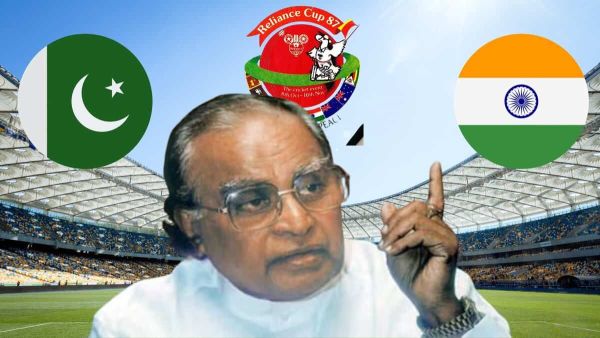
As every cricket fan knows, the Lords ground is the home of cricket. It holds a significant cultural and traditional importance in the history of the game. Similarly, the Marylebone Cricket Club (MCC), founded in 1787, which owns the ground, was once the premier body in the game and wielded immense influence wherever cricket was played.
Due to these factors, England was the dominant figure in the corridors of power in world cricket. But in 1983, something happened that turned the tables and sparked off India’s rise to the top. It was an incident that took place off the field that altered the course of cricket history.
That year the well-known senior politician Siddhartha Shankar Ray, who had served as Chief Minister of West Bengal, as a Union Minister as well as an ambassador, was visiting London with his wife when the World Cup was in progress. Wishing to watch the Indian team in action, Ray got in touch with fellow Minister NKP Salve who was also the President of the BCCI at that time. Ray asked Salve (who was already in London) whether two tickets could be arranged for him and his wife to watch the game.
Cricket captain in his youth
Ray had been the captain of Kolkata’s famous Presidency College’s cricket team when he was a student. He was a cricket lover and wanted to see the action live. India’s match against the West Indies was an event that he did not want to miss.
So Salve instructed BCCI secretary A.W. Kanmadikar to request the concerned MCC official for two extra tickets on the final day. Salve was sure that the request would be granted. In India, such courtesy to a visiting dignitary is never denied.
Salve was shocked
But to his shock and dismay, he found that Kanmadikar returned empty-handed. When Kanmadikar described the manner in which his polite request had been treated by the officials at Lords, Salve was outraged. Later, he said in an interview: “The bitter reality was brought home to me that even if India reaches the top of the game on the field, off the field we will be treated in a shabby manner. In the politics of cricket, we would still be minnows.”
From that day, Salve decided to change the script. He decided that he would show his power during the next World Cup. The minister began to lay his plans for hosting the next edition of the event on Indian soil. The day after India had lifted the trophy, Salve invited the players, his friends, and several top cricket officials for a celebratory lunch.
One of the people he invited was Air Marshal Nur Khan of Pakistan who was then the President of the Board of Control for Cricket in Pakistan (then called BCCP but now known as PCB). Salve and Nur Khan were good friends, and during the course of the conversation, Salve broached the topic of hosting the next edition of the World Cup within the Indian subcontinent.
Pak official enthusiastic
The Air Marshal responded with great enthusiasm. “That is a brilliant idea, Salve saab. We must do it and show our abilities to these arrogant Englishmen,” he said. Gamini Dessanayake, President of the Sri Lankan board who was among the luncheon invitees, was also thrilled with the idea when he was told about it.
The group needed the support of as many countries as possible, so the associate nations Hong Kong, Singapore, and Malaysia were roped in. The West Indians were wooed during a tour of India in 1983-84 when Allan Rae, the President of the West Indies Cricket Board, was convinced to support the sub-continental effort.
Indo-Pak joint bid
On the 19th of July, 1984, at the Lords ground, the ICC general body meeting was held. Here, India and Pakistan jointly made a bid to host the next edition of the World Cup. The bid proposed a remuneration and prize money that were beyond the reach of England.
The President of the Test and County Cricket Board of England (TCCB), Charles Palmer, finally had to admit: “England has never claimed any divine right to host the World Cup. We acknowledge that the times are changing and we must change too.”
However, they did raise plenty of questions about the paying capability, hotel accommodation and other financial aspects of organising such a huge venture. To all this, Salve thundered: “Gentlemen, I have come prepared for all your questions and doubts. I have brought the balance sheet of the BCCI with me and everyone of you can take a look at our financial standing.” Air Marshal Nur Khan did the same. The two of them left no stone unturned, and when the vote was held, the Indo-Pak proposal pipped England by 16-12.
First time outside England
So, in 1987, the next World Cup was successfully jointly hosted by India and Pakistan. It was the first time that the event was held outside England. Reliance Industries came forward to sponsor it. Dhirubhai Ambani’s backing was a huge advantage, and so the trophy was named the Reliance World Cup. Instead of Lords, the grand final match was held at the equally majestic Eden Gardens ground in Kolkata.
The two host nations, India and Pakistan, lost their matches in the semifinals, but perhaps quite fittingly, England lost the final match to Australia. Following that victory, over the next few decades, the Aussies went on to become the most successful team in the World Cup.
After that successful hosting coup, gradually India emerged as the epicentre of world cricket. Nowadays, players from all over the world are eager to play in the lucrative IPL tournament. India is the fulcrum where the big sponsors are present and the game generates unimaginable sums of money every year. But it all began with the denial of two tickets to a VIP from India by the haughty English officials.
-
Aneet Padda avoids paps, says ‘mujhe sharam aa rahi hai’

-
Pakistan May Lose Crores If Asia Cup Is Cancelled - Know Estimated Earnings

-
Bank Holidays Next Week: Check How Many Days Banks Will Remain Closed, See RBI Calendar HERE

-
Major Accident On Mumbai-Pune Expressway: One Dead, Several Injured As 15-20 Vehicles Collide; Massive Traffic Jam Reported (WATCH)

-
Coronation Street's Helen Worth seen for first since exit at Jack P Shepherd's wedding
